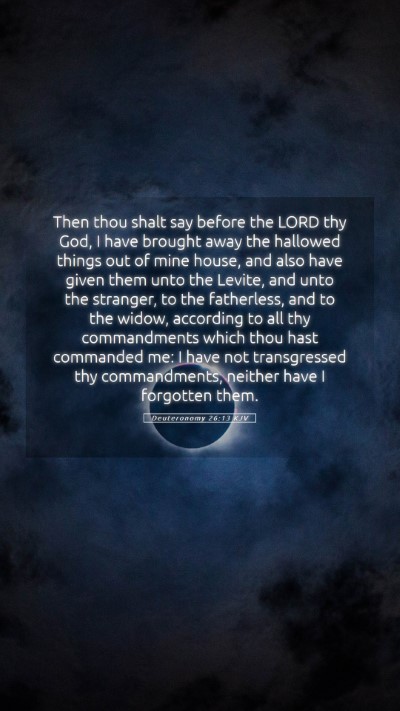Bible Verse Meaning and Commentary on Deuteronomy 26:13
Bible Verse: Deuteronomy 26:13 - "Then you shall say before the Lord your God, 'I have removed the sacred portion out of my house, and also have given it to the Levite and to the alien, the orphan and the widow, according to all Your commandments which You have commanded me; I have not transgressed or forgotten any of Your commandments.'
Overview
This verse emphasizes the importance of accountability, gratitude, and obedience to God's commands. The act of declaring the removal of sacred portions reflects a commitment to the Lord's prescribed way of worship and honoring Him through charitable acts.
Insights from Commentaries
-
Matthew Henry's Commentary:
Matthew Henry highlights the significance of the sacred portion, which was meant for the sustenance of the Levites, foreigners, or those in need. This reminder serves as a public confession of the worshiper's faithfulness to God’s commandments and the care for those in community.
-
Albert Barnes' Notes:
Barnes emphasizes the ritual aspect of this declaration as it underscores both the individual's responsibilities and the communal obligations within Israel. The act of giving a portion to the Levites signifies the necessity of supporting those who serve God, thus maintaining the spiritual economy of the community.
-
Adam Clarke's Commentary:
Clarke points out that this verse illustrates the appropriate expression of gratitude towards God for His provision and blessings. By publicly stating the fulfillment of this command, the individual acknowledges both personal obedience and communal welfare.
Understanding Scripture: Key Themes
- Accountability to God: The declaration stresses the importance of being accountable before God for the offerings one has made.
- Charity and Community Support: The act of giving the sacred portion specifically to the marginalized encapsulates the biblical mandate to care for others.
- Obedience to God's Commandments: The verse serves as a reminder of the necessity to follow God’s laws diligently.
Application in Daily Life
This verse can serve as a guiding principle for modern believers, encouraging them to:
- Practice transparency in their spiritual and community commitments.
- Engage in charitable acts that reflect their faith and obedience to God.
- Regularly assess and declare their commitments to God's commands in practical ways.
Bible Cross References
- Leviticus 27:30: Discusses the tithe and the sacred portion dedicated to the Lord.
- Deuteronomy 14:28-29: Highlights the importance of caring for the Levite, the foreigner, and the needy.
- Malachi 3:10: Addresses the giving of tithes and the blessings that follow obedience to God’s commands.
Conclusion
Deuteronomy 26:13 encapsulates fundamental themes of fidelity to God’s commandments and the communal responsibility towards those in need. This understanding can enhance Bible study insights and foster deeper engagement with Scripture as believers explore meanings behind biblical verses.


